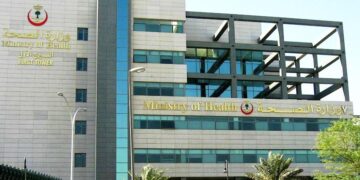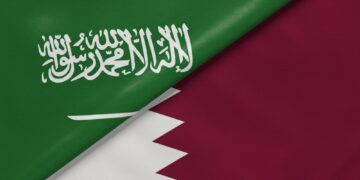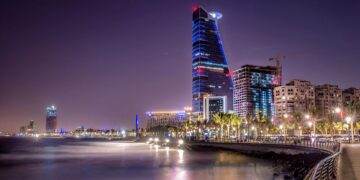With the initiation of a staggering $250 million logistics center at Jeddah Islamic Port, the Middle East is witnessing a paradigm shift in its logistics sector. This cutting-edge facility represents a collaborative venture between DP World and the Saudi Ports Authority (Mawani), setting the stage for a significant leap in regional commerce by augmenting efficiency and refining operational procedures.
As the premier mega-logistics park in Saudi Arabia, it stands as a testament to the transformative influence such facilities have on the trading landscape and economic development.
Mega-logistics parks are expansive, strategically designed industrial zones tailored to support the complex demands of modern-day logistics. These hubs are crucial for the storage, handling, distribution, and movement of goods, greatly enhancing supply chain processes. Equipped with state-of-the-art infrastructure and technology, these parks offer a centralized ecosystem that boosts efficiency and cuts down on operational expenditures.
The role of mega-logistics parks extends beyond simple storage solutions; they provide comprehensive warehousing options, including bonded and non-bonded areas as well as a range of storage environments from dry to refrigerated. Strategically located to harness the connectivity of ports, airports, and railway systems, these parks drive down transportation costs while improving the efficiency of distribution networks.
Technological advancements are at the heart of these logistics parks, with automated systems and digital tools playing a key role in streamlining operations and minimizing labor expenses. Furthermore, many modern parks are embracing sustainability through measures like solar panels, efficient lighting, and water recycling, aiming to lessen their environmental footprint and align with worldwide sustainability initiatives.
These parks also offer value-added services such as product customization and assembly, aiding companies in refining their supply chains and catering to customer preferences with greater precision.
The Jeddah Islamic Port logistics park, sprawling over 415,000 square meters, is poised to become Saudi Arabia’s most extensive integrated logistics park with a warehouse space of 185,000 square meters. This park is expected to start operations in the second quarter of 2025, and will be developed in two phases. Its proximity to the core shipping route connecting Asia and Europe, alongside DP World’s South Container Terminal, underscores its strategic significance in enhancing multimodal connectivity and capacity for handling burgeoning trade volumes.
The park’s strategic location not only ensures efficient storage and distribution but also provides a seamless link for importers and exporters to streamline their supply chains. Its development is in line with Saudi Arabia’s Vision 2030, which envisions the country as a pivotal logistics hub. The project resonates with the National Transport and Logistics Strategy, which focuses on escalating the number of logistics centers within Saudi ports and nurturing global partnerships.
Around the globe, the impact of mega-logistics parks on supply chain efficiency, cost management, and sustainability is evident. For instance, the Alliance Global Logistics Hub in Texas and India’s Multimodal Logistics Parks exemplify the success of such integrated facilities in streamlining goods movement and enhancing economic competitiveness.
Companies like Ocean Spray and DHL have reaped the benefits of these logistics solutions through reduced emissions and cost savings. In particular, DHL’s collaboration with Schneider Electric, utilizing Sustainable Aviation Fuel, has showcased the potential for carbon footprint reduction while maintaining optimal delivery schedules.
The inauguration of the Jeddah logistics park is a landmark event for the Middle East logistics sector. This facility embodies the vast potential of mega-logistics parks to revolutionize trade, elevate supply chain effectiveness, and contribute to Saudi Arabia’s Vision 2030 ambitions.









